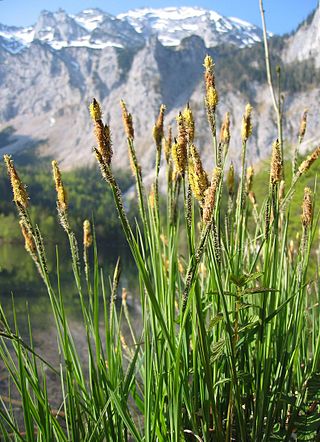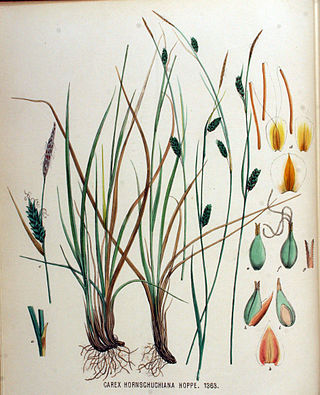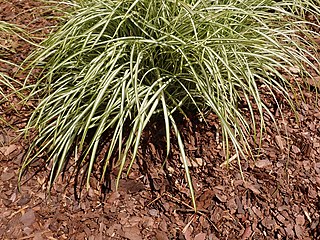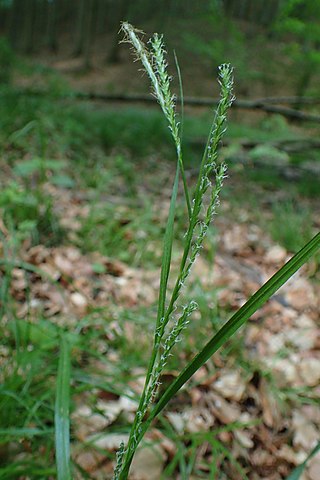
Ornamental grasses are grasses grown as ornamental plants. Ornamental grasses are popular in many colder hardiness zones for their resilience to cold temperatures and aesthetic value throughout fall and winter seasons.

Carex is a vast genus of nearly 2,000 species of grass-like plants in the family Cyperaceae, commonly known as sedges. Other members of the family Cyperaceae are also called sedges, however those of genus Carex may be called true sedges, and it is the most species-rich genus in the family. The study of Carex is known as caricology.

Carex morrowii, the kan suge, Morrow's sedge, Japanese grass sedge or Japanese sedge, is a species of flowering plant in the family Cyperaceae. It is native to central and southern Japan, and has been introduced to Belgium, Denmark and Austria.

Carex elata, tufted sedge, is a species in the genus Carex, native to all of Europe, the Atlas Mountains of Africa, Turkey, Iran and Central Asia. It prefers to grow with its roots in water. Its cultivar 'Aurea' has gained the Royal Horticultural Society's Award of Garden Merit.

Carex oshimensis, the Japanese sedge, is a species of flowering plant in the genus Carex, native to Japan. With its striped foliage, it is widely used as a non‑spreading ground cover. Its cultivar 'Evergold' has gained the Royal Horticultural Society's Award of Garden Merit. Growing to 50 cm (20 in) tall and broad, it has a broad yellow stripe down the centre of each leaf. It is an easy subject for moist soils in sun or partial shade.

Carex divulsa, the grey sedge, is a species of flowering plant in the genus Carex, native to Macaronesia, Europe, northwest Africa, the Caucasus region, and the Middle East as far east as Turkmenistan. It has been introduced to northeast Argentina, the District of Columbia and Pennsylvania in the United States, Ontario in Canada, the North Island of New Zealand, and Tasmania and Victoria in Australia. It is the namesake of the Carex divulsa aggregate.

Carex hostiana, the tawny sedge, is a species of flowering plant in the genus Carex, native to Europe and northeast Canada, and extinct in Massachusetts. It is a member of the Carex flava species complex.

Carex ornithopoda, called the bird's foot sedge, is a species of flowering plant in the genus Carex, native to most of Europe, and Anatolia. A variegated cultivar is commercially available.

Carex strigosa, the thin-spiked wood sedge, is a species of flowering plant in the genus Carex, native to Europe and the Caucasus region. Its diploid chromosome number is 2n=66.

Carex lachenalii, called the twotipped sedge and hare's foot sedge, is a species of flowering plant in the genus Carex, native to temperate and subarctic North America, Greenland, Iceland, Europe, and Asia, and the South Island of New Zealand. Its diploid chromosome number is 2n=64, with some uncertainty.

Carex elongata, the elongated sedge, is a species of flowering plant in the family Cyperaceae, native to Europe, the Caucasus, western Siberia, Kazakhstan, and the Altai. It occurs in boggy woodland and wet meadows, where it forms dense tussocks up to about 1 m tall.

Carex trifida, the mutton-bird sedge, is a species of flowering plant in the family Cyperaceae, native to Macquarie Island of Australia, the South Island, the Antipodes Islands, and the Chatham Islands of New Zealand, southern Chile, and the Falkland Islands. There are a number of cultivars, including 'Rekohu Sunrise', 'Glauca', and 'Chatham Blue'.

Carex dipsacea, the teasel sedge, is a species of flowering plant in the family Cyperaceae, native to New Zealand. Preferring poorly drained soils, it is planted as an ornamental for its colorful autumn foliage. There is a cultivar, 'Dark Horse', which is commercially available.

Carex petriei, the dwarf brown sedge, is a species of flowering plant in the family Cyperaceae, native to New Zealand. It can be used where a brown to copper-coloured ground cover is desired.
Carex chathamica is a species of sedge in the family Cyperaceae, native to the Chatham Islands of New Zealand. Grey-backed storm petrels nest in its tufts.

Carex leersii, the grassland sedge or many-leaved sedge, is a widespread species of flowering plant in the family Cyperaceae. It is native to the Atlas Mountains in Africa, Europe, the Middle East, Central Asia, the Altai and the western Himalayas, and has been introduced to New Zealand. It is a member of the Carex muricata group, and prefers to grow in sunny, relatively dry locations.

Carex gaudichaudiana, also known as fen sedge, is a tussock-forming species of perennial sedge in the family Cyperaceae. It is native to parts of Australia and New Zealand.
Carex iynx, the tussock sedge, is a species of flowering plant in the family Cyperaceae, native to South Australia, New South Wales, Victoria, and Tasmania in Australia, and introduced to the North Island of New Zealand.
Carex alsophila, commonly known as forest sedge, is a tussock-forming species of perennial sedge in the family Cyperaceae. It is native to Victoria in south eastern Australia.
Carex cephalotes, also known as wire-head sedge, is a tussock-forming species of perennial sedge in the family Cyperaceae. It is native to south eastern Australia and New Zealand.

















